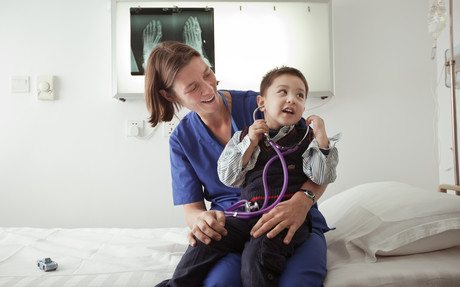Enjoy working overseas — safely
By Laini Bennett
Tuesday, 24 October, 2017

Working abroad can be a very rewarding experience, but for health practitioners, it can mean greater exposure to diseases than they would encounter in Australia, through an environment where health and safety practices are limited or not always abided by. So how do you protect yourself and your team? We talk to Dr Neil Nerwich from International SOS, a medical and travel security risk services company providing 24-hour support to mobile workers, including medical and security assistance, telehealth, medical intervention and evacuation/repatriation.
In his role as Group Medical Director – Assistance, Dr Nerwich has seen it all. From the Ebola pandemic in Sub-Saharan Africa and the Zika outbreak in Brazil, to repatriation from natural disaster zones or mass casualty events. On a quiet day, an infectious disease, a car accident or a woman giving birth on a plane. Dr Nerwich is responsible for 26 medical and security Assistance Centres and International SOS’s air evacuation and repatriation services, leveraging a global staff of several thousand doctors, nurses, medical transport and operational personnel globally. Peers manage their Medical Services division of clinics in 92 countries, and between them and their teams, they provide an integrated service protecting and supporting thousands of mobile workers every day.
Dr Nerwich outlines a 10-step guide to protecting yourself and your team from illness when working overseas.
Prevention is the best medicine
- Do your pre-travel research and understand the country you’re going to, its security and health risks. Visit or if your organisation is a member of International SOS, read their online country guides.
- Make sure your organisation knows exactly where you will be travelling, and has an alternative means of reaching you should disaster strike. Register with the government’s Smart Traveller site or, if you are an International SOS client, subscribe to its program, which enables travellers to be located and immediately communicated with if there is an incident.
- Educate yourself on infectious diseases you might encounter. Refresh your memory on prevention methodologies, the signs and symptoms, and treatments. International SOS offers e-learning on Zika, malaria and other dangers to mitigate the risks deploying travellers might encounter. “It’s all about prevention in the first place,” Dr Nerwich said. But he cautions that travellers must also be aware of physical risk. “Many incidents happen from motor vehicle and pedestrian accidents and other risk behaviours that cause injury rather than sickness.”
- Understand the level of medical support in the countries you’re travelling to. “If you’re a 55-year-old with heart disease travelling to New York and London, from a medical perspective there are very good facilities which can arrange your care. But if you’re that same person travelling to Afghanistan or Somalia, you’re at significantly higher risk,” Dr Nerwich said.
- Undertake a physical screening. This will help ascertain if you have any medical conditions that will impact your fitness to travel to your particular destination, and whether local medical facilities will meet your needs. For instance, you may need to pack extra medication for an existing condition; it may not be available in your overseas destination, and counterfeit medicine is a hazard in some countries. Ensure your insurance cover is broad enough, particularly for existing conditions. Clients of International SOS can subscribe to their travel prescreening program.
- Vaccinate against known risks. “Look at specific exposures you might have, and consult a clinic for appropriate prophylaxis,” Dr Nerwich said. You may need vaccination against cholera, typhoid, tuberculosis, malaria or a host of other diseases rarely seen in Australia. “Diseases like tuberculosis may be prevalent and can be multidrug resistant, which is difficult to treat. If a traveller has a chronic disease like diabetes or a disease that lowers immunity, the risk of contracting an infectious disease can be significantly higher,” he said. There are also vector-borne diseases — mosquito-borne illnesses such as malaria, which in many countries is resistant to certain antimalarials. In this instance, selecting the correct preventative medication is very important. Also consider the impact existing medications can have when taking prophylactic medications.
- Take preventative actions. For example, avoiding gastroenteritis in South East Asia. “There are risks particularly related to food and water. Precautions such as safe bottled water, well-cooked food, avoiding salads and fruit rinsed in local water, not bathing or swimming in stagnant water and personal hygiene. They’re all essential, in addition to mosquito nets and repellants, long sleeve clothing and other measures,” Dr Nerwich said.
- Be aware of occupational hazards. As a health professional working abroad, you are exposed to the local population, national patients who have illness and disease that may be endemic and not frequently encountered in Australia, increasing your risk of contracting infectious disease. “In an austere environment, limited resources may mean that medical equipment may not be sterilised to the standards seen in Australia, disposables may be re-used, needles may be non-retractable etc. These add to the risk, and may result in a higher chance of exposure,” Dr Nerwich said. Be sensible — wear appropriate personal protective equipment, avoid body fluid contact and take precautions to avoid needle-stick injuries.
- If you feel unwell, or are worried about exposure, act immediately. “Fever today can be life-threatening malaria tomorrow,” Dr Nerwich pointed out. “For someone in Paris it might be flu, while for someone in Nigeria it could be malaria — they need to be managed very differently.” Call your travel insurer, or if your organisation is a member of International SOS, a call to their Assistance Centres will put you in direct contact with a medical team that understands the symptoms, and the environmental and personal health risks. They will refer you, or your team member, to appropriate care to mitigate the problem before it becomes more serious, or will treat it if it has already progressed.
- Undergo a medical check on your return home. It is good practice to have a medical review after your return home. If you start to feel unwell after you’ve returned, see a medical practitioner as soon as possible and tell them where you have travelled. It may be more than a cold. “Some serious diseases can present weeks or even months later,” Dr Nerwich said, “so have a healthy suspicion.” If you’re treating a patient who was hospitalised overseas, be aware that there may be a risk of potential disease exposures. Be cognisant that they may transfer multiresistant organisms from the hospital they have originated from, so take the necessary precautions.
For more information visit and
International SOS identifies six benefits to your organisation in mitigating risks related to a mobile workforce:
- Meet duty of care.
- Improve health and safety of staff.
- Improve likelihood of project assignment success.
- Staff retention.
- Brand reputation.
- Avoid unnecessary medical evacuation costs.


Could this strategy mark a turning point in the HIV-cure search?
A team of Australian researchers have repurposed the same mRNA delivery system used in COVID-19...
Key concerns this Sarcoma Awareness Month
July is Sarcoma Awareness Month, and the Australia and New Zealand Sarcoma Association has raised...
Queensland gains private hospital surgery for lymphoedema
Greenslopes Private ���ϳԹ�Ⱥ�� in Brisbane now offers advanced microsurgery for lymphoedema,...





